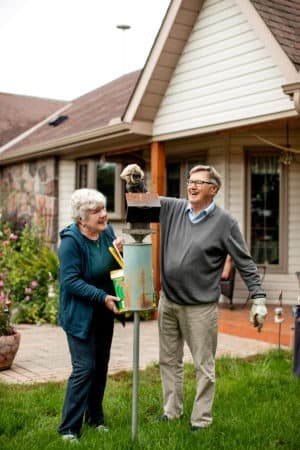COVID-19: No Match for Judy
On April 9, 2020, Judy Carson stood outside of RVH’s Emergency Department and waved goodbye to her husband, Reg. Neither of them could have known it was the last time they would see each other for seven weeks.
Judy’s COVID-19 diagnosis would send her on a journey she almost certainly would not have recovered from if it wasn’t for the life-saving care she received at RVH.

After 58 years of marriage, Judy and Reg had never spent more than a week or two apart in nearly six decades. They moved to Oro-Medonte in the late 90s from Montreal. They wanted space and to make a life near the water where they could enjoy retirement. That’s exactly what Oro gave them.
Before the pandemic, Judy was an avid gardener, meticulously caring for her 15 flower beds, walked for fun and participated in a twice-weekly exercise program at Dalston United Church that she credited for keeping her mind and body in good health.
So, when she and Reg decided to go on a month-long cruise to South America in March of 2020, a lengthy hospital stay was the last thing on their minds. Unfortunately, COVID-19 had other plans.
Just 10 days in, Judy fell ill aboard the ship. She was put on oxygen and told she had acute bronchitis. “I thought that diagnosis was strange because I have had bronchitis in the past,” she explained. “I had never needed oxygen before.”
Upon returning to Canada, she tested positive for COVID-19 and her family doctor directed her to go to the Emergency Department at RVH immediately. That’s where the then 76-year-old began the fight of her life.
“Do you know what a power of attorney is?” A member of Judy’s care team posed the question to her not long after her arrival. It caught her off-guard. “Of course, I knew what that was,” she explained. “But what I didn’t know was why they were asking.”
Judy’s condition quickly deteriorated and she spent three weeks in intensive care. She was intubated while a ventilator took over the labour of breathing for her, giving her body a much-needed break — an experience she has limited memory of. Later she would learn just how close she was to death.
“I can’t even imagine what it must have been like for my husband to receive a phone call from the hospital in the middle of the night asking him to prepare the family for the worst.”
Judy Carson
“There was a time when they didn’t expect me to make it,” she recounted. “I can’t even imagine what it must have been like for my husband to receive a phone call from the hospital in the middle of the night asking him to prepare the family for the worst. As a mother of three and a grandmother, I don’t want to think how my family would have felt in that moment.”
Of her stay in the ICU, Judy said, “I don’t recall a lot of it, but I do remember being in a glass room where everyone at RVH could see me. They were so encouraging, so supportive. They would walk by and wave and motivate me to get better.”
Strict COVID-19 protocols meant Judy was alone – there were no visitors allowed. So, in addition to providing life-saving care, Judy’s care teams helped her stay positive too.
“I can’t say enough about the care I received,” she said. “It’s the extra little things you really remember. I was weak. I couldn’t see my family, so the nurses would hold up a tablet so that I could FaceTime with my husband and read emails. They would post pictures on my walls. It really helped me get through it.”
In total, Judy spent seven weeks in the hospital between the Intensive Care and Respiratory units. After 46 days, she was ready to see Reg in person.
RVH staff lined the halls clapping as she was wheeled out to the exit – some even came in on their day off to ensure they got to say goodbye.
“That was pretty special,” she said.
Today, Judy is beating the odds. She is back to her regular workouts and back in the garden tending to her flowers. She knows how fortunate she is to be able to enjoy the things she loves.
“I just want people to know that their donations to RVH can make a real difference,” she said. “My husband and I try to donate to the hospital frequently because we know that without donations RVH would not have made the progress that it has. It’s so important for our region to have all the specialized care we do right here.”
For Judy, the thing she now values most about living in Oro is not the space, nor the proximity to the water. It’s access to the great care she has come to rely on at RVH.
To keep patients like Judy living their wild life, please make a donation today.

